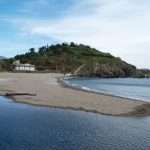The morning paper carried news of the disappearance of a man fishing at the next cove; the story explained the activity of the local lifeboat and the police helicopter, which had made repeated passes along the coast. The sad and pointless lost brought memories of an August afternoon four years ago
After a wet and misty morning, the cloud had finally broken and bright Basque sunshine had lit the coast. This was what brought people there, the vast sweeping white beaches that ran on forever. The whole of the country could have been there and it would not have been crowded.
We had walked to the beach. Massive Atlantic waves pounded the sand, making a spectacular scene and a dangerous place. Red flags and large notices forbade bathing; only a fool would endanger their life by going into that water.
We walked a couple of miles to the south. Small knots of people were dotted here and there; enjoying the sunshine; flying kites; playing beach tennis or football or frisbee. The change in the weather had brought a mood of merriment.
As we turned back and headed north, a gathering of a dozen or so people stood at the water’s edge. Passing by, there seemed no urgency, but minutes later waving began and two young boys went running towards the distant lifeguard station; hundreds of people were now standing and watching.
‘Didn’t you see? Someone was swimming; now they have disappeared’.
A few more minutes passed before a battered old pickup came down the beach carrying three lifeguards on the back. People at the water’s edge pointed to where they had last seen the swimmer. The lifeguards dived into the terrifying surf, but the man had now been under the water for so long, it seemed a grim task.
One half of the beach stood and watched; the other half continued its recreation. ‘Come on’, I said, ‘I’ve seen enough bodies in my time’.
We reached the road as vehicles with flashing blue lights arrived; fifteen minutes later, there was the dull thud of helicopter blades. By evening a cluster of police cars marked the search for a nineteen year old who had come on holiday and had ignored the warnings.
Had the rain continued that August day, the vast Basque beach would have remained empty and that boy would have returned safely to his family in a northern industrial town. If yesterday had been a wet day, if the wind had still blown sharply from the mountains, then the man might have stayed at home, might never have gone fishing, might never have fallen into the water.
‘If only’ is a pointless comment; the history of the world would be different if life could be changed by saying ‘if only’. There is no purpose, no meaning in such a loss; simply a sense of the thinness of the thread on which life hangs.
